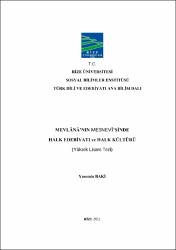Mevlana'nın Mesnevi'sinde halk edebiyatı ve halk kültürü
Abstract
Bu çalışmada XIII. yüzyılda yaşayan ünlü sûfî ve şair Mevlânâ'nın Mesnevî adlı eserini Halk edebiyatı ve halk kültürü açısından inceledik. Mevlânâ'nın en meşhur eseri olan Mesnevî pek çok dile çevrildi ve üzerinde pek çok çalışma yapıldı. Bu çalışmada başlangıçta Mevlânâ'nın hayatı ve eserleri hakkında kısaca bilgi verdik ve Mesnevî'nin öneminden bahsettik.Birinci bölümde Mesnevî'deki Halk edebiyatının anonim eserlerinden olan fıkra, masal, menkıbe ve halk hikâyelerinden örnekler verdik, bu türlerin ardından Mevlânâ'nın çeşitli görüşleri üzerinde durduk.İkinci bölümde Mesnevî'de yer alan evlenme, ölüm, halk hekimliği, halk inançları, halk mutfağı, gelenek ve görenekler üzerinde durduk, ardından Mevlânâ'nın görüşlerinin ile Anadolu Türk kültürü ve inançlarına etkisini açıkladık. This study attempts at examining Mawlânâ?s Mathnawi. Mathnawi is the masterpiece of Mawlânâ. He is a sufi and a poet of XIII. century. Mawlânâ?s Mathnawi is one of the most studied works in Turkish folkliterature. Mathnawi is Mawlânâ?s famous book. Mathnawi has been translated into many language and it commentated on many countries. Firstly we introduced to the life of Mawlânâ. After we summarized the sources, content, influences and importance of the Mathnawi.In the first part which includes at the Mathnawi anonymous folk literature; joke, folktale, legend, fairy tale, romance are explained and forms, contents are evaluated. At the end of this section dwelled on the crictisicism thought by Mawlânâ?s from various point in wiew.In the second part we prepared at the Mathnawi?s products of transition periods of times like; marriage, death traditions and believes, fasts, ceremonies, folk cuisine, folk profession of doctor are mentioned. After we intend to discuss the influence which Mawlânâ?s views have exercised on the connection of Anatolia Turkish culture with traditions and believes.


















